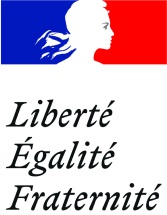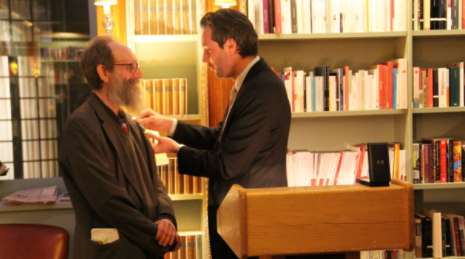On Monday, December 15, 2014, Cultural Counselor Antonin Baudry conferred the insignia of the Order of Arts and Letters on Richard Brody at a reception at Albertine Books within the Cultural Services of the French Embassy in New York.
A film critic for The New Yorker since 1999, Richard has written extensively on French cinema and directors, including Francois Truffaut, Jean-Luc Godard and Claude Lanzmann. Since 2005, he has been the movie listings editor at The New Yorker, where he writes film reviews and a blog on the magazine’s website. He is the author of Everything Is Cinema: The Working Life of Jean-Luc Godard (Metropolitan Books, 2008). Through his reviews and other writings, Mr. Brody has introduced little-known aspects of French cinema to an American audience. During the ceremony, Mr. Baudry praised Richard’s interdisciplinary approach, calling him “…a master of all literary media.”
____________________________________
Dear friends, chers amis,
Tonight it is my deep pleasure to recognize Richard Brody. We could begin with his literary accomplishments. There are indeed many. We might exalt Brody as an “ambassador of sorts for French cinema in the United States” which is true as well. The leading expert on Godard, absolument! But I am going to try something different, maybe risky and even nervy. I am going to start with Truffaut. Yes, you heard me correctly, not Godard, but Antoine Doinel instead. How many people here know the character, Antoine Doinel? To give a short summary, Antoine is the fictional character that Truffaut created for his debut feature Les Quatre Cent Coups and later followed throughout his work for over 20 years. The two shared similar childhood experiences and may have been an alter ego for the director. In any case, in Les Quatre Cent Coups, Antoine is tormented in school by his horrid and insensitive teacher, Sourpuss. He constantly runs into trouble, skipping class, running away and towards problems with his parents. Sourpuss is authoritative, narrow-minded and manipulative. BUT, what if we imagine a different plot? What might have happened to Antoine if he met Brody instead? He would have surely filled him with passion and importantly offered a generous and humble manner that was inspiring and provocative? I will venture to say that Antoine’s actions and the plot ending would have been starkly different!
Richard Brody is exactly what Antoine needed. I am sure that Richard’s friends and family will agree with me. And especially his wife and daughters, Maja, Louise and Juliette, who provide him with endless support and inspiration.
Now I have described what Richard is not – Sourpuss. But Who Richard DOES embody? I will put forth, Averroès, the medieval Andalusian Muslim scholar and philosopher.
Richard began his course of studies at Princeton as a philosophy major. He was passionate about jazz, baseball and philosophy in his youth and a direction seemed clear. Only something happened, he accepted an invitation to see Breathless and I quote “seeing that was an experience that reoriented all my atoms…the movies were the art form that synthesized all the feelings that excited me, that I dreamed of. To me it seemed like the epitome of modern art, the kind of art that I cared about.” This is not to say that Brody had never seen a film. Sure he had growing up on Long Island, but always as simple entertainment, never knowing there was such a thing as the “art of cinema.” Well, Breathless changed everything. Brody never left behind jazz, philosophy or baseball. Rather he has weaved his interests seamlessly into his work and it shows. Like Averroès, who finds ways to reconcile medicine, law, religion, philosophy, Brody takes on all of his passions to create an art all to his own. And also like Averroès, does so with discernment, generosity and the humblest of natures.
Richard Brody lends a discreet, eloquent and powerful voice to cinema, with an artfulness so far unmatched. And what is so extraordinary about this voice is that it reaches seasoned critics and cinema novices alike. Your intellectual and accessible mastery of the corpus is evident in your magnum opus, Everything is Cinema: The Working Life of Jean-Luc Godard. With a sympathetic eye, you examine the creative processes and challenges of this revered artist without falling into clichés – Godard the revolutionary, Godard the anti-capitalist, Godard the misunderstood. What emerges is a thought-provoking portrait of both the director’s shifting ideals and the times that shaped them. Throughout the book, you swiftly navigate the most fundamental French political and creative movements of the post war era and of course May ’68 and what came next. The end result is a rare and unique perspective that illuminates the stakes of being a filmmaker in the tumultuous twentieth century.
Richard, your discerning eye and your nuanced perspective on Godard, whom you call “not a pop culture guy […], a high culture guy touched by elements of pop culture” has transformed you into a similar mutable and versatile figure. You are a master of all literary media. Though it was Breathless that initiated you into the world of film, and the book Godard on Godard that led you to understand what makes a director, your most important body of work is, of course, your reviews for The New Yorker. Since 1999, you have contributed a thoughtful and original voice to this publication, covering not only film and television but music, opera and diverse cultural spheres.
No other publication depicts French culture with such deep respect for its complexity. With insightful leaders like Henry Finder and David Remnick at the helm, France is illustrated with a sharp and penetrating eye. New Yorker pages bring each nuance of our history – the lightness, darkness, heaviness, honesty, and joy – to the surface.
And readers needn’t have a Ph.D. in contemporary history. No background is necessary to learn from the original and accessible – not to mention essential – texts you share.
Simply put, the New Yorker gives its eponymous reader and the globe as a whole an authentic view of our country, defining us as much more than croissants and stripes. But Richard, you know that words are sometimes inadequate to express the whims of our society, and this is where images come in. In a world where language often fails to create meaningful change, Godard too proposed images as salvation. You and your New Wave muse so clearly understand that ideas can be trite when written, and can become sublime when expressed as an image.
You once said, “When I go to the movies, I sit in the front row. That way, I have to turn my head to see everything that’s on screen. It’s true to the way movies look, and feel, to me: each image is more than one image, both visually and in thought. The images of movies reflect the work of many people and even a director’s own conflicting ideas. Sitting up close makes the complexity and diversity of each image a physical reality.”
I would go so far as to say that you have surpassed Godard: you manage to weave images through your written texts. You illustrate a principle rather than simply naming it. When I read your reviews and especially your blog posts from “The Front Row,” I am struck by the expansiveness of your perspective. Instead of confining film to a series of rules or technical terms, you open the medium to infinite possibilities for interpretation, and it jumps out in front of our eyes.
*
American Director Vincente Minnelli once said, “Dali was the great painter then and surrealism was a way of life.” As you likely know Dali took a radical and dream-inspired way of painting and made it a lifestyle. It wasn’t just about the mustache. You have done the same with cinema. Instead of trying to gain a vue d’ensemble in film, you plunge into the messiness. Instead of preserving a safe distance the art that has the power to torment, provoke and surprise, you dive in unafraid. By not shying away from the complexities of the work, you advise without persuading, you inform without manipulating and you serve up this art to the minds of your audience with impeccable authenticity.
*
At the end of Les Quatre Cent Coups, the mean teacher tells Antoine “You are suspended until the end of the semester!” after the little boy plagiarizes a passage from Balzac. I might argue that this suspension was the best thing for Antoine. He finally gets a chance to live.
Not only does he take a break from school, but also gets to skip out on reality. In some respects, your work is a welcomed hiatus from reality, and we can be doubly happy with your reverie because you have taken France with you.
If there is someone in America who knows the works of Lanzmann, Godard, Resnais, Chabrol, Varda, and the more contemporary French cinema better than Richard does, I can’t imagine who it is. You inhabit French cinema the way Godard, when he was young, inhabited the movies of Hitchcock and Hawks. And you share this corpus of knowledge across this country.
Like our philosopher Averroès who combines religion and philosophy, who values secularism and yet heeds to the mystical hand of religious thought, you offer a solid bridge between the diverse mentalities in French and America, and between art and philosophy.
Once, when asked how you write, you said, “The act of writing itself is almost transcendent. Nobody should ever be proud of their writing because nobody should ever take credit for their writing. It happens to you.”
For this humbleness, generosity of intellect and passion, it is now my honor to bestow you with the Ordre des arts et des lettres.
Richard Brody, au nom du gouvernement français, je vous fais Chevalier dans l’Ordre des Arts et des Lettres.



